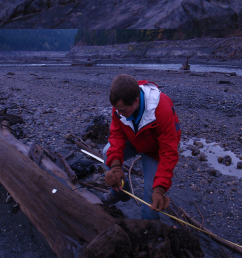Environmental Science Field Camp
Field Camp 2024
ESCI Field Camp consists of four integrated courses taught in spring by Dr. John McLaughlin. Most time will be spent at field sites away from campus, precluding enrollment in other courses and most other substantial time commitments during the months of April and May. The group will camp, prepare meals, study, conduct field research, and travel together. During Field Camp, students will design solutions to conservation problems and conduct original field research projects. The research projects will culminate in research poster presentations during WWU’s Scholars Week.
Field Camp will begin with instruction on research design and field methods and preparation for attending a scientific conference. It will conclude with research presentations in WWU’s Scholars Week. During the intervening weeks, the program will complete all stages in the research process. In this sense, successful participants will emerge from the program as competent field scientists. They will develop skills in hypothesis development, study design, field research methods, data analysis, and scientific communication. Participants also will develop conservation designs, informed by knowledge about conservation science and practice. Travel in wilderness settings will help participants develop knowledge and competence in wilderness skills, including navigation, risk management, group organization, rope skills, river travel, food preparation, living with wildlife, and Leave-No-Trace practices.
Field Camp schedule will be compressed and intense. There will be at least two orientation and preparation meetings during winter quarter. The first two weeks of spring quarter will consist of classroom sessions and day trips to local field sites. The third week will involve a backpacking trip to access backcountry study sites. During the fourth week, we will attend a scientific conference. In the fifth and sixth weeks we will conduct research in remote study areas accessed via a river expedition. We will spend the seventh week on campus, where we will complete data analysis and poster design, printing, and presentation. Final research reports will be due by the end of spring quarter.
Field Camp integrates the following four courses, totaling 15 credits.
- ESCI 408 Field Methods in Wildlife Ecology (5 credits)
- ESCI 433 Population Biology (3 credits)
- ESCI 438 Scientific Writing & Presentation (3 credits)
- ESCI 409 Riparian Conservation or ESCI 439 Conservation of Biol. Diversity (4 credits)
Field Camp is not for everyone. Weather conditions will be beyond our control, which may require participants to distinguish between wants and needs. Participants must do without amenities common in town for week-long periods. Hiking to field sites and camps will require substantial physical exertion and fitness. Time commitments during April and May will be demanding, which may preclude employment or much time and energy spent on other relationships and responsibilities. Extensive group work on research and camp activities may not suit people who prefer to work alone. After spending weeks mostly immersed in nature, some people may find returning to urbanity unsettling.
Top Ten Reasons to Do Field Camp

- Become a real scientist.
- Gain wildlife research experience.
- Participate in the nation's most comprehensive ecosystem restoration project.
- Complete ESCI degree requirements: 7 WP points, 2 "lab" courses.
- Start summer employment or travel early: class meetings end late May.
- Learn to identify diverse wildlife taxa.
- Develop competence in wilderness skills and travel.
- Teamwork: achieve more as a group than you could as an individual.
- Eat well!
- Present your research at a conference; add to your resume.
- Publish your research.
- Doing field science is fun!
For more information:
Visit Dr. John McLaughlin's Field Camp site with more details.
Connect with the instructor, Dr. John McLaughlin:
- Office: ES 434
- Phone: 360-650-7617
- Email: jmcl@wwu.edu